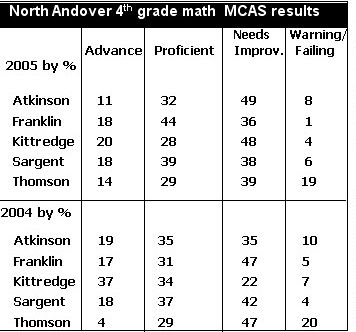By: Tom Duggan – October, 2005
 Last month the North Andover School Committee approved measures to evaluate academic expectations and goals for students in the North Andover School System.
Last month the North Andover School Committee approved measures to evaluate academic expectations and goals for students in the North Andover School System.
School Committee member Charles Ormsby made a motions, which was unanimously approved. The motion was to intended to support the school committee initiatives adopted last year. Part of this motion specifically seeks information from the superintendent regarding efforts to achieve those goals. Other aspects of the motion make clear the school committee’s position supporting a rigorous academic experience for all North Andover Students. (See Ormsby’s motion in box at right)
Included in this motion, the Superintendent has been directed to report his progress back to the School Committee at the next regular meeting. Dr. Ormsby should be commended for putting forth this important motion and the rest of the school committee should be commended for unanimously approving it.
I’m hopeful that the Superintendent will produce plans to measure goals for the children of North Andover. I’m also concerned about the need to implement these goals. The goals are for academic standards such as an in-crease in MCAS results and increased Advanced Placement students.
I was concerned last week when I opened up my 4th graders MCAS math results and saw that the percentage of “needs improvement” (39%) and “warning/failing” (19%) at the Thomson School totaled more than the “proficient” (29%) and “advanced” (14%). I immediately called parents from other schools in the district to see how other elementary schools did. “Not much better” was the answer I received and was given their numbers to further review. No parent I spoke with was happy with their numbers.
While other districts had schools on the federal watch list because of their MCAS results, the entire North Andover school district was placed on the “watch list”. When I began looking at the numbers I was quite startled when I compared 4th grade math for 2004 to 2005. Specifically, reviewing the “pro-ficient” and “needs” improvement” categories. At both Kittredge and Atkinson the “needs improve-ment” category was nearly 50%, much higher than “proficient” and much higher than in 2004.
Now I look to the Superintendent to implement the goals for student academic achievement. With the new math curriculum and implementation of the Houghton Mifflin program, I am optimistic that the numbers will eventually improve. Because the entire district is now on the watch list, this is an opportunity for the superintendent to turn the results around and achieve our goals. Not only will the federal government be watching, but I, as well as many parents will be watching too.
Dr. Ormsby’s Expectation Initiatives
A) That the Superintendent translate the School Committee’s district-wide academic goals into traceable goals for various levels in the organization with a particular emphasis upon top level administrators. The Superintendent should report to the School Committee on these goals and how their achievement will lead to successful accomplishment of the district-wide goals;
B) That the Superintendent establish a plan to ensure that grades and honor roll lists reflect substantially elevated academic expectations and that, for all courses, parents and students have information that explicitly informs them of a student’s achievement level compared to that student’s peers;
C) That the Superintendent remove any communications in the district’s guidance to students or parents indicating that lower levels of effort on homework or otherwise is accepted of any students regardless of academic standing. While the School Committee recognizes that there will be exceptions, it is our policy to set an expectation of rigorous efforts for all students and that this expectation should be consistently communicated to all students and parents in our policy manuals and any other student/parent communication;
D) That the Superintendent develop guidance to staff that encourages homework assignments focusing on academic content while minimizing assignments that are high in effort but low in subject matter content and that these guidelines should also be provided to parents;
E) That the Superintendent establish clear, concise and measurable guidelines for achievement in core academic subjects by grade level that are suitable for distribution to students, parents and the larger community. Both nominal expectations (which should be high) and minimum requirements should be included for each subject and grade;
F) That the Superintendent review our policies and procedures regarding class assignments to see if more grouping on a homogeneous basis by student achievement levels can ease teacher burdens and improve instructional efficiency in the classroom; and
G) That at our next meeting, the Superintendent advise the School Committee of an appropriate timetable to report to us the information requested by Subsections A, B, D, E and F of this motion.
